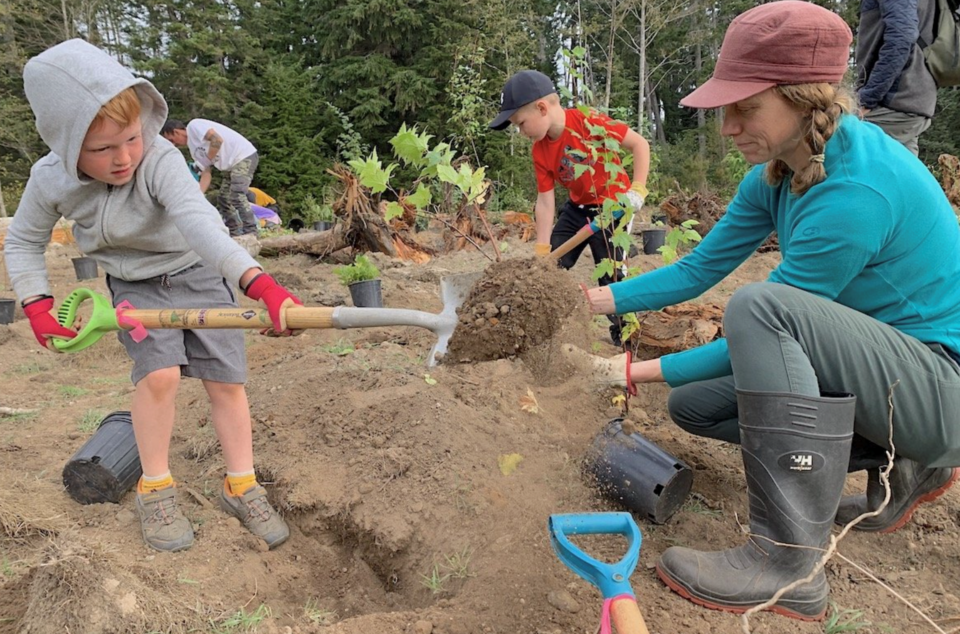Quadra Elementary’s kindergarten students tried their best to follow instructions and stay seated on tarps that were spread out on the school field in an attempt to keep them clean.
But the lucky kids near the edges of the blue plastic matting already had their hands in the dirt.
The 60-plus children recently gathered with members of the We Wai Kai Nation, Quadra Island school and community leaders and the B.C. Wildlife Federation to celebrate their new wetland restoration project by planting a selection of native trees and shrubs.
The wetland will provide a habitat for endemic plants and animals and serve as an outdoor classroom for students, said Sheldon Etheridge, the School District 72 teacher who spearheaded the project.
Nothing underscores the importance of protecting or restoring wetlands at a community level like drought conditions across the province provoked by a global climate crisis.
“It’s exciting. The project’s all coming together,” Etheridge said.
“Except for the water.”
Vancouver Island and much of the B.C. coast, often dubbed the “Wet Coast”, has been anything but — with minimal rain and high temperatures in August, September and much of October.
The South Coast and all of Vancouver Island are at Level 5 drought conditions — the most severe rating, with impacts to the ecosystems or economy being “almost certain” — the BC Drought Information Portal reported on Oct. 13.
But when rains return, the recently excavated basins will fill and vegetation will set and grow, boosting biodiversity, said Miranda Cross, wetland restoration specialist and the project’s designer.
As early as next year, insects like dragonflies and mayflies and amphibians such as Pacific chorus frogs and rough-skinned newts, as well as blue herons and other waterfowl, will populate the space, Cross said.
“It will be interesting to see if it holds water all year round,” she said.
Regardless, the wetland will help Quadra Island be more resilient to climate change by filtering and capturing water to mitigate impacts such as fire, floods and droughts, she added.
The enriched soil and new plants will also capture carbon, Cross said.
“Restoring wetlands helps reverse greenhouse gas emissions by sinking carbon and providing critical habitat for species at risk and all sorts of other critters,” she said.
The idea to reclaim the historic wetland came to Etheridge during the pandemic when he sloshed to his outdoor classes through the north field’s poorly drained section.
He reached out to the B.C. Wildlife Federation (BCWF), which has established school wetland programs and has a track record in wetland restoration projects, for help.
“They said it seemed like a project they could get behind, and they sure did.”
With the help from the BCWF, We Wai Kai Nation, the Quadra Island Climate Action Network, extensive community support, and around $70,000 in funding from sources such as the federal EcoAction Community Funding Program, the wetland came to fruition over the last two years, he said.
But before digging into the project, Quadra Elementary students spent last year learning about wetlands — the annual focus of their WILD B.C. School program, which supports outdoor, place-based learning.
The program and the wetland project illustrate the importance of schoolyards with wild spaces that children can engage with through play or formal learning on a regular basis, Etheridge said.
Schools and students can be leaders of a rewilding movement that is so critical to dealing with climate change, the water crisis or biodiversity deficit, he added.
“Kids can be involved in the healing of these damaged landscapes … and really take ownership over those spaces — carrying that through the rest of their lives,” Etheridge said.
“I can’t think of anything more hopeful than getting involved in rewilding and restoration projects.”




